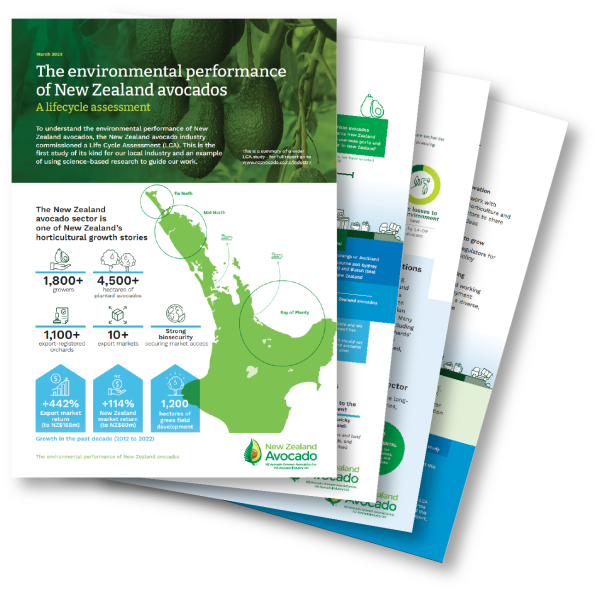To understand the environmental performance of Aotearoa New Zealand avocados, the New Zealand avocado industry commissioned a Life Cycle Assessment (LCA). This is the first study of its kind for the New Zealand industry and an example of using science-based research to guide decision making.
 |
New Zealand Avocado looked at the environmental footprint of the avocado supply chain
This study used Life Cycle Assessment. LCA measures the environmental footprint of a product over its life cycle. It provides science-based data that helps to understand, manage, and communicate environmental performance.
Click on image to enlarge
The four environmental effects that were assessed
In 2020 NZ Avocado carried out a materiality assessment. Their stakeholders believe these are the most important environmental topics for the avocado industry:
- Carbon footprint
- Nutrient losses to waterways
- Water footprint
- Toxic losses to the environment
These results give NZ Avocado a benchmark for environmental performance
The carbon footprint is 0.7kg of CO2-eq for each kg of packaged Hass avocados produced in Aotearoa New Zealand. These are the other measured impacts:
NZ Avocado will use this benchmark to continue to improve the industry’s environmental and business performance
Next steps include
- Continuing to reduce and manage their environmental footprint and risks
- Extending the findings from the LCA report to improve industry practices
- Working with their supply chain partners to reduce indirect greenhouse gas emissions (Scope 3 emissions).
Shreyasi Majumdar and Professor Sarah McLaren from the New Zealand Life Cycle Management (NZLCM) Centre conducted the LCA for New Zealand Avocado. Our Head of Quality Assurance, Gaya Gamage, verified the study. Brad Siebert, Deputy CEO of NZ Avocado, presented on this topic to the World Avocado Conference in Auckland. He used the content and diagrams in this Nutshell and all conference delegates received a copy.
Read more in the full nutshell below
23 May 2023

